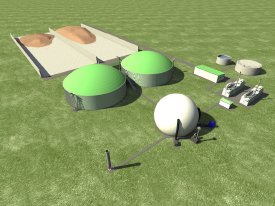May 23 2011
In April, WELTEC BIOPOWER started building a biogas plant in Szeged, Southern Hungary.
The client and operator is Zöldforrás Energia, a subsidiary of the Hungarian power supplier DÉMÁSZ. The 1 MW plant, which comprises two CHPs with an output of 600 kW/h each, will generate power and heat from pig manure and maize silage starting from end of 2011 on.
The substrate will be supplied by farmers in the vicinity of the site. In turn, the farmers will use the digestate left over from the biogas production process as fertiliser for their fields. The generated heat will be used to heat office buildings.
 Model of the WELTEC plant: additionally, an external 650 cubic metres
gas storage tank will be installed on site.
Model of the WELTEC plant: additionally, an external 650 cubic metres
gas storage tank will be installed on site.
The WELTEC biogas plant comprises two 3,000 cubic metres fermenters with doublemembrane roofs. Thus, the fermenters have a gas buffer capacity of 1,016 cubic metres each. Additionally, an external 650 cubic metres gas storage tank will be installed on site (see figure). The objective is to benefit from the electricity prices, which are twice as high at daytime, in the best way possible. Thus, the biogas will be collected in the fermenter storage tank and in the external gas storage tank at night, and the two CHP modules will run under full load at daytime. One of the reasons why Zöldforrás Energia awarded the contract to WELTEC and the Hungarian sales partner Inwatech was that WELTEC systems not only provide a high power and heat yield, but also guarantee low internal energy consumption.
Being determined to push ahead power generation on the basis of renewable energies, Hungary promotes the establishment of biogas plants by means of one-time financial subsidies and other means. According to the German-Hungarian Chamber of Industry and Commerce, the subsidies are expected to play a key role in increasing the share of renewable energies in the energy consumption to 13 percent by 2020. At present, there are 12 biogas plants throughout the country. Another 40 are in the planning stage or already under construction. By 2020, the biogas capacity is to be expanded to a total of about 32 MW, which would represent a 5 percent share of biogas in the energy generation from renewable energies.
Most of the projects will be launched in connection with subsidised investments in animal husbandry. Previously, the long amortisation periods proved to be an obstacle to investments. For this reason, the feed-in tariffs and other factors are being examined. While biogas and natural gas are presently subject to equal tariffs, biogas is to be given preference in the grid in the future. Hungary already has an efficient natural gas grid and is thus well prepared for the global trend to use natural gas and biogas for generating electricity.